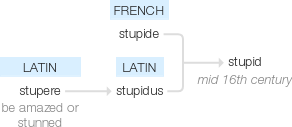Stupid
mid 16th century: from French stupide or Latin stupidus, from stupere ‘be amazed or stunned’.
wiktionary
From Middle French stupide, from Latin stupidus(“struck senseless, amazed”), from stupeō(“be amazed or confounded, be struck senseless”), from Proto-Indo-European *(s)tup-, *(s)tewp-(“to wonder”), from Proto-Indo-European *(s)tew-(“to stand, stay”). Cognate with Old High German stubarōn(“to be astonished, be stunned, be blocked”). Related also to Old English stoppian(“to block, stop”). See stop.
etymonline
stupid (adj.)
1540s, "mentally slow, lacking ordinary activity of mind, dull, inane," from French stupide (16c.) and directly from Latin stupidus "amazed, confounded; dull, foolish," literally "struck senseless," from stupere "be stunned, amazed, confounded," from PIE *stupe- "hit," from root *(s)teu- (1) "to push, stick, knock, beat" (see steep (adj.)). Related: Stupidly; stupidness.
Native words for this idea include negative compounds with words for "wise" (Old English unwis, unsnotor, ungleaw), also dol (see dull (adj.)), and dysig (see dizzy (adj.)). Stupid retained its association with stupor and its overtones of "stunned by surprise, grief, etc." into mid-18c. The difference between stupid and the less opprobrious foolish roughly parallels that of German töricht vs. dumm but does not exist in most European languages.
